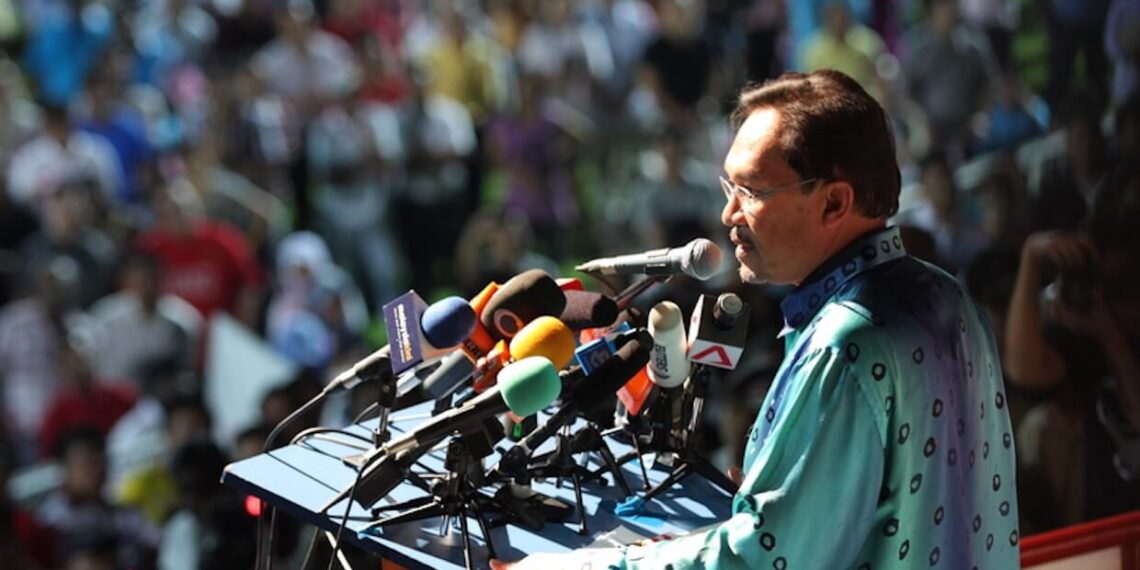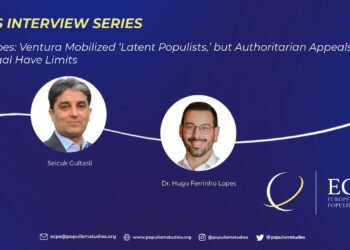Please cite as:
Shukri, Syaza & Hassan, Isyraf. (2025). “Anwar Ibrahim’s Civilisational Populism: The Gaza War and Malaysia.” Journal of Populism Studies (JPS). October 9, 2025. https://doi.org/10.55271/JPS000119
Abstract
This paper examines how Anwar Ibrahim, Malaysia’s tenth prime minister, employs civilisational populism in shaping his foreign policy rhetoric, particularly during the Gaza War that started in 2023. Through the lens of civilisational populism defined by Yilmaz and Morieson as a political strategy that constructs “the people” as defenders of a superior but threatened civilisation, the paper argues that Anwar leverages the Gaza/Palestinian cause to project Islamic solidarity and deflect domestic criticisms of liberalism. In doing so, he seeks to consolidate support against the conservative Islamist opposition, PAS, while maintaining international legitimacy. Drawing on the framework of Foreign Policy Decision Making (FPDM), the study emphasizes the role of individual agency, cognitive calculations, and domestic political pressures in guiding Malaysia’s external stance. Anwar’s rhetorical and symbolic actions such as mass rallies, public condemnations of Israel, and economic restrictions on Israeli-linked entities are analysed not simply as moral positioning but as calculated decisions aimed at managing political survival within a fragmented coalition. The paper highlights contradictions in this approach, such as the BlackRock controversy and local backlash over prioritizing Palestinian aid over domestic needs, revealing the tension between foreign policy idealism and domestic political pragmatism. By integrating FPDM with civilisational populism, the paper provides an understanding of how Malaysia’s foreign policy is not purely reactive or interest-based but shaped by identity politics, leadership perception, and populist imperatives.
Keywords: Anwar Ibrahim; Malaysia; civilisational populism; foreign policy; Gaza War; Palestine; Islamic solidarity; populist rhetoric; domestic politics; identity politics; PAS; leadership agency
By Syaza Shukri & Isyraf Hassan
Introduction
The pendulum of civilisationism has swung. After the fall of the Berlin Wall, humanity entered an era of globalisation where connectivity prevailed. However, it did not last, and now that we are in the third decade of the 21st century, we are referring back to Samuel Huntington’s most well-known work, which states that civilisation will be the basis for clashes. In the 1990s, the Washington Consensus fostered a wave of neoliberal globalization, making civilisational divisions seem unlikely. However, following the devastating events of 2001, these divisions have become more apparent, especially against Islamic civilisation. Instead of all-out war, the divisions we are seeing occurs within the framework of national elections. Politicians today are increasingly using civilisationism as part of their populist strategies to win votes.
According to Yilmaz and Morieson, civilisational populism is a political ideology that combines elements of populism with a civilisational framework. It involves a discourse that portrays a particular civilisation—often religious or cultural—as superior and under threat from outsiders or other civilisations. They argued, “populist uses of civilisational discourses differ from non-populist discourses insofar as they use civilisationism to construct internal divisions between an ingroup who they claim belong to ‘our’ civilisation (‘the people’), and outgroups (‘elites,’ ‘others’) who they claim have either betrayed the civilisation of the people or belong to a threatening foreign civilisation,” (Yilmaz & Morieson, 2022: 8).
This form of populism appeals to sentiments of cultural heritage, identity, and belonging by positioning "the people" as defenders of their civilisation against perceived existential threats.
For this paper, we are looking at civilisational populism and its impact beyond the nation-state. We argue that Anwar Ibrahim, the tenth prime minister of Malaysia, has been involved with civilisational rhetoric for the purpose of gaining support. Domestically, Anwar’s main political rival is the Islamist Malaysian Pan-Islamic Party (PAS). Shukri (2023) argued that PAS definitely participated in the civilisational narrative of Islam against non-Muslims, specifically non-Muslim Chinese of Malaysia. On the other hand, Anwar, as argued by Shukri (2024), is more of an inclusivist populist. There is heightened political tension in Malaysia between the Islamists that get support from the majority Malay population and Anwar’s own coalition that is usually labelled derogatorily as “liberal” and finds support among non-Muslims and urban Malays. Due to this pressure, Anwar needs to portray himself as a “defender” of Malays and Muslims but in a civilisational way beyond Muslims in Malaysia in order to maintain his inclusivist reputation. Specifically, this paper will look at Anwar’s rhetoric on the Israel-Gaza War that erupted in October 2023.
Anwar has established himself as an Islamist since his days as a youth leader, and he later transitioned to become a Muslim democrat (Malik & Shukri, 2018). However, we observe that his more assertive rhetoric since becoming prime minister is slightly different from his days as the deputy prime minister under Mahathir Mohamad’s first administration. As a result, it may have led to intra-civilisational discord with other Muslim countries, such as with Saudi Arabia, albeit before the start of the ongoing war, when he was unable to meet either the king or the crown prince during his first visit as prime minister.
The next section will look at Malaysian politics and Anwar Ibrahim’s background. Next, we will look at the literature on civilisational populism and foreign policy decision making in order to provide a framework to guide our understanding of Anwar’s rhetoric about Palestine, Gaza, and the Muslim world. Following that, we will delve deeper into Anwar’s civilisational populism and his relationship with other Muslim leaders. The penultimate section will discuss the impact of Anwar’s civilisational rhetoric in the broader Muslim world context.


